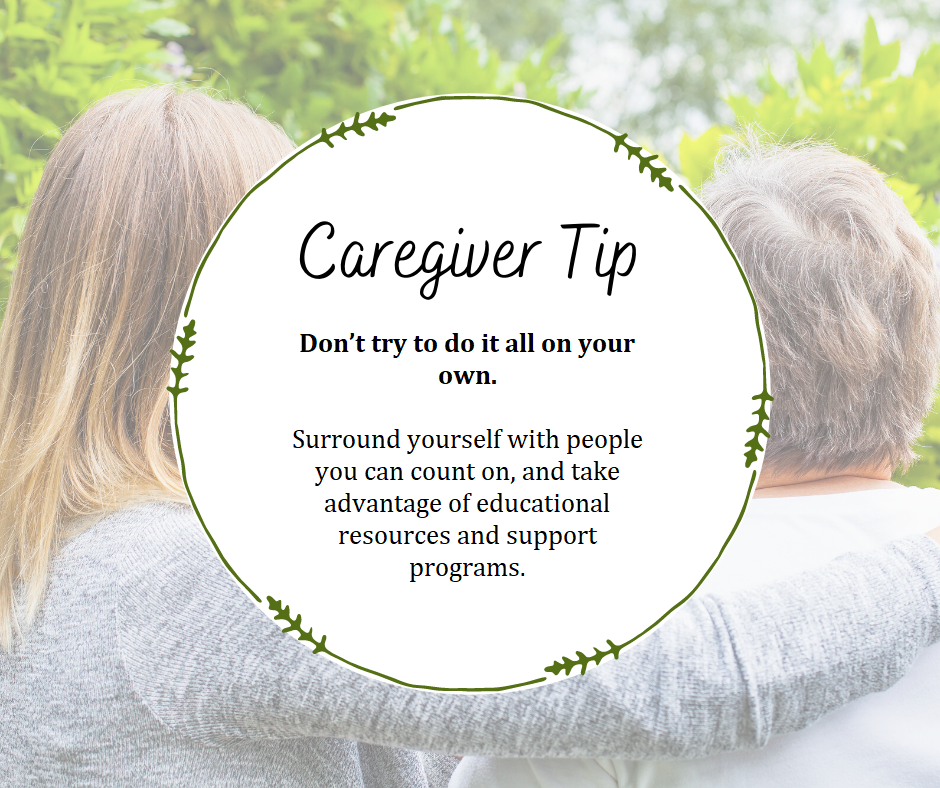
Dear Caregiver,
If you are caring for a loved one who is living with Alzheimer’s disease, you do not need us to tell you that it’s not easy. This progressive disease is difficult to cope with – for both the person living with it and their loved ones. People living with Alzheimer’s may become frustrated when they find themselves struggling to do things they used to do without any problem. And it is hard for you, as the caregiver, to watch the person they once were gradually fade away. They may have brief moments of clarity where it feels like they are themselves again; only to break your heart when the moment is gone.
While there is nothing anyone can do or say to “fix” what you and your loved one are going through, we want you to know you do not have to face it alone. The Alzheimer’s Association has an abundance of resources for both those
living with Alzheimer’s and their
caregivers. There are
support and educational
programs available for both, as well. Take advantage of these resources. They are there to help make things a little easier.
Understanding Alzheimer’s Disease
It all starts with gaining a better understanding of the disease and how it
progresses. Alzheimer’s leads to nerve cell death and tissue loss throughout the brain. This results in the brain shrinking dramatically over time which impacts nearly all its functions.
Although scientists are not completely certain what causes cell death and tissue loss in a brain affected by Alzheimer’s, plaques and tangles appear to be the culprits. Plaques form when protein pieces called beta-amyloid clump together, and tangles destroy a vital cell transport system made up of proteins. Plaques and tangles tend to spread through the cortex in a predictable pattern as Alzheimer’s disease progresses, but the rate of progression varies greatly.
Early Stage
In the earliest stages, plaques and tangles begin to form in brain areas involved in learning and memory, as well as thinking and planning. In this stage, a person can still function independently but may start to notice they are sometimes forgetting familiar words or where to find everyday objects.
Someone in this stage may struggle to:
- Think of the right word or name for something
- Remember the name of someone they just met
- Remember something they just read
- Plan or organize things
Middle Stage
In the middle stage, more plaques and tangles develop in the regions of the brain important for memory, thinking, and planning. This leads to the development of problems with memory or thinking that are severe enough to interfere with work or social life. In this stage, someone with Alzheimer’s may have trouble handling money, expressing themselves, and organizing their thoughts. Plaques and tangles also spread to areas involved in speaking and understanding speech and the sense of where your body is in relation to objects around you. It is in this stage that many people are first diagnosed.
Symptoms vary from person to person, but may include:
- Forgetting events or personal history
- Feeling moody or withdrawn
- Being unable to recall personal information such as their address
- Confusion about what day it is or where they are
Late Stage
Most of the cortex is seriously damaged by the time someone reaches the late stage of Alzheimer’s disease. By this point, the brain shrinks dramatically due to widespread cell death. Individuals often lose their ability to communicate, recognize family and loved ones, and to care for themselves in this stage.
In this stage, symptoms are severe and may include:
- Need for around-the-clock personal care
- Loss of awareness of recent experiences and their surroundings
- Changes in physical abilities such as walking and eventually swallowing
- Difficulty communicating
- Vulnerability to infections, especially pneumonia
Resources for Each Stage
The Alzheimer’s Association provides excellent resources for caregivers for each stage. Visit the links below to learn more.
Early-Stage Caregiving
MIddle-Stage Caregiving
Late-Stage Caregiving
Additional Information
Yours truly,
Abode Hospice and Home Health



